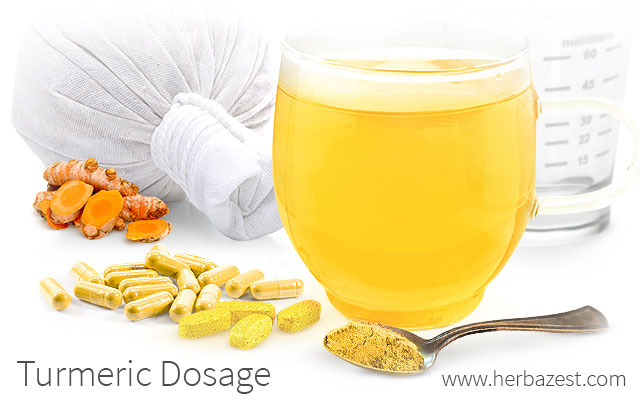Figuring out how much turmeric per day is good for you can be a tricky business. In fact, numerous scientific studies have been conducted in order to establish a recommendation for a turmeric dose that strikes the perfect balance of both safety and efficacy. Despite the wide variety of medicinal uses of turmeric, knowledge about the long-term effects of turmeric supplement dosage has been limited due to insufficient clinical research.
Turmeric Dosage for Pain and Inflammation
Turmeric capsules. The use of turmeric capsules for fighting pain and inflammation is becoming increasingly popular. A standard daily dose of 500-mg dose of turmeric's curcumin, formulated with other compounds for better absorption, is recommended for optimal results.
Turmeric tea. Boil three teaspoons of minced fresh, raw turmeric with one cup of water to make an anti-inflammatory turmeric tea. Powder can also be used, and honey, cinnamon, lemon, or ginger can be added to taste. Since turmeric is fat soluble, adding some coconut milk will allow for better absorption.
Turmeric Dosage for Skin Treatments
Turmeric poultice. The anti-inflammatory effects of turmeric for skin irritation are more effective when 100 grams of freshly-sliced turmeric root are wrapped into a sealed gauze or mesh bag. Boil in water for one hour. Let cool and apply directly to the skin.
Turmeric paste. Mix one heaping tablespoon of ground turmeric with two tablespoons of honey. Apply this turmeric paste as an even layer over the face and neck. After 15 minutes, rinse with warm water.
Turmeric Dosage for Arthritis
Turmeric capsules. The recommended dosage of turmeric for arthritis symptoms relief - mainly for melting away pain and joint swelling - is 600 mg when taking curcumin capsules.
Turmeric extract. For pain relief and enhanced comfort, a daily 30-drop dosage of turmeric extract should be taken orally, preferably with a glass of water.
Turmeric Dosage for Liver Health
Turmeric decoction. This decoction of turmeric for liver health will boost choleretic activity in the body. Boil 1/4 cup of fresh turmeric root in three cups of water for 45 minutes. Add honey or spices just before serving, and consume one cup of the warm liquid twice daily.
Turmeric pills. A dosage of about 400 - 500 mg of turmeric tablets or capsules is recommended to reap turmeric benefits for the liver.
Turmeric Dosage for Diabetes
Turmeric yogurt. Mix one teaspoon of turmeric powder and two teaspoons of lemon juice together in a low-fat, sugar-free yogurt to be consumed before bed.
Golden milk. This a very popular preparation of turmeric for inflammation relief and for helping thwart pre-diabetic conditions. Steep two teaspoons of ground turmeric in warm milk. Adding some ground black pepper into the preparation will allow for better absorption.
Risks of High Turmeric Dosage
While taking turmeric for common health concerns can be quite fruitful for most people, observing the proper dosage is absolutely essential. As with many other herbs, turmeric side effects are generally related to over consumption. High levels of turmeric consumed daily have been known to cause stomach discomfort in sensitive individuals.
Although further research is needed, it has been reported that when taken in doses higher than three or four grams daily, turmeric supplements and medicinal preparations may cause abdominal pain, nausea, diarrhea, and digestive discomfort.
Dosages with Other Forms of Turmeric
Since different varieties of turmeric contain varying levels of curcumin, actual dosage recommendations for consuming the dried or fresh rhizome are relative. Estimates recommend doses as high as 60 grams of fresh turmeric root, up to four grams of the dried powder, or as many as 30 drops of turmeric extract a day.
On the one hand - because curcumin concentration plays such a vital role in establishing daily turmeric recommendations - a good rule of thumb is to note that curcumin generally makes up about three to five percent of turmeric's total composition.
On the other hand, turmeric pills recommendations can help to take the guesswork out of understanding how much turmeric to take. To increase bioavailability, it is recommended to take them in two or three small doses throughout the day without exceeding three grams daily.
Turmeric Cautions
The following safety considerations should be taken into account before consuming turmeric:
Medications. Antiplatelet activity in turmeric may cause excessive bleeding when combined with certain anticoagulation medications. Turmeric has also been known to trigger adverse reactions in conjunction with some non-steroidal anti-inflammatory drugs (NSAIDs).
Allergic sensitivities. People with certain allergies may be susceptible to dermatological reactions when turmeric is applied topically. Moreover, patients applying topical doses should take care to avoid excessive sunlight.
Pregnancy and breastfeeding. While culinary consumption is safe, women should not take turmeric supplements during pregnancy and lactation.
Turmeric can be taken safely and effectively as part of a well-maintained diet and overall health regimen. However, depending on a number of different physiological factors, turmeric's dosage tolerance can vary from person to person, and it is recommended to consult with a primary care physician before use.
Sources
- Essential Guide to Herbal Safety, pp. 609 – 612
- International Research Journal of Pharmacy, Comparative studies on curcumin content in fresh and stored samples of turmeric rhizomes, 2011
- Journal of Basic and Clinical Physiology and Pharmacology, Gastroprotective activity of essential oils from turmeric and ginger, 2015
- Natural Product Communications, Biological studies of turmeric oil, part 3: anti-inflammatory and analgesic properties of turmeric oil and fish oil in comparison with aspirin, 2014
- Nutrition and Cancer, Curcumin content of turmeric and curry powders, 2006
- Medicinal Plants of the World, p. 118
- University of Maryland Medical Center, Turmeric




